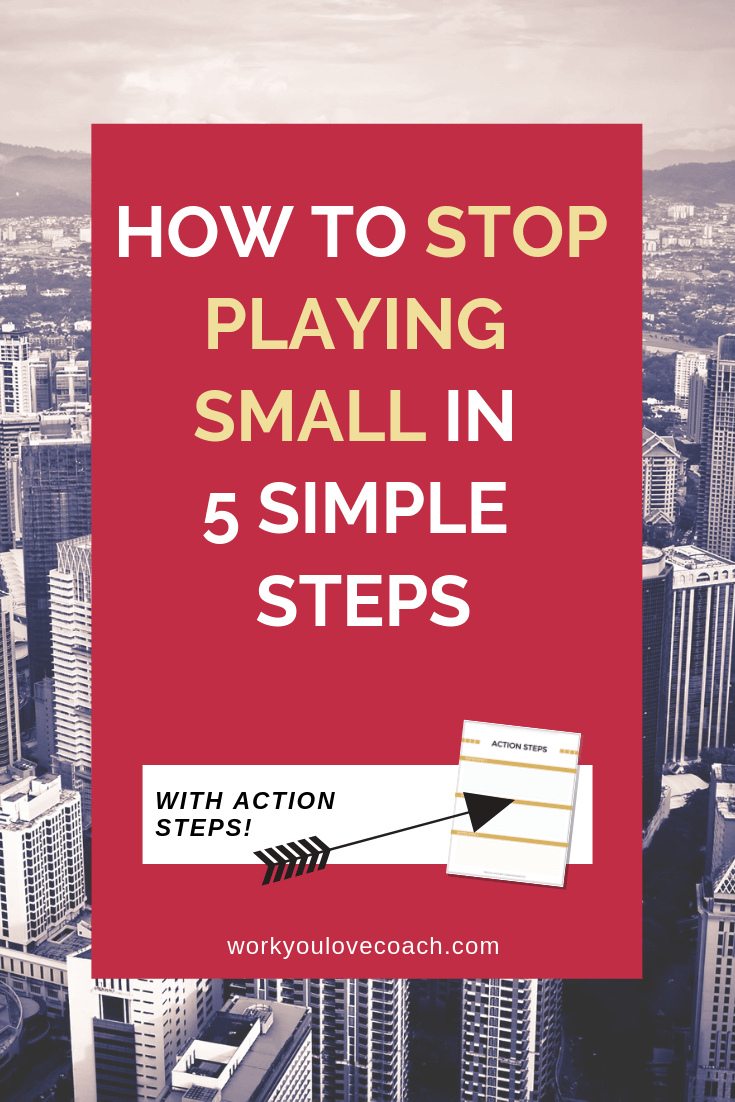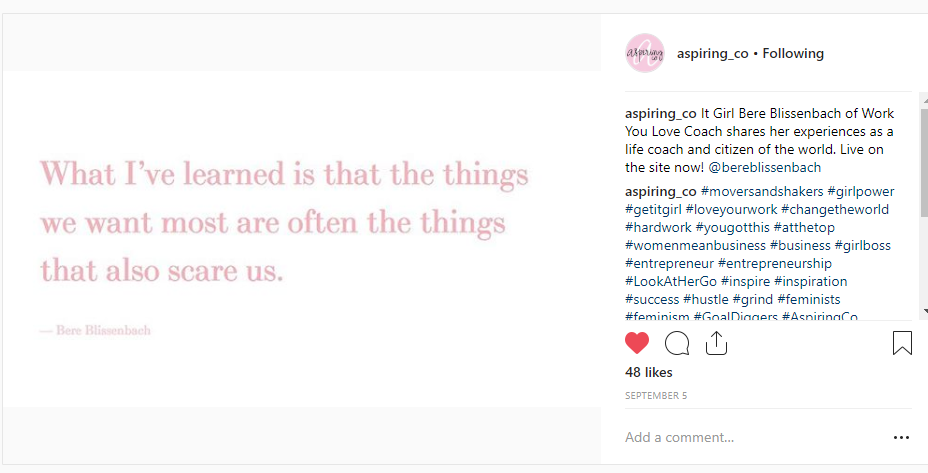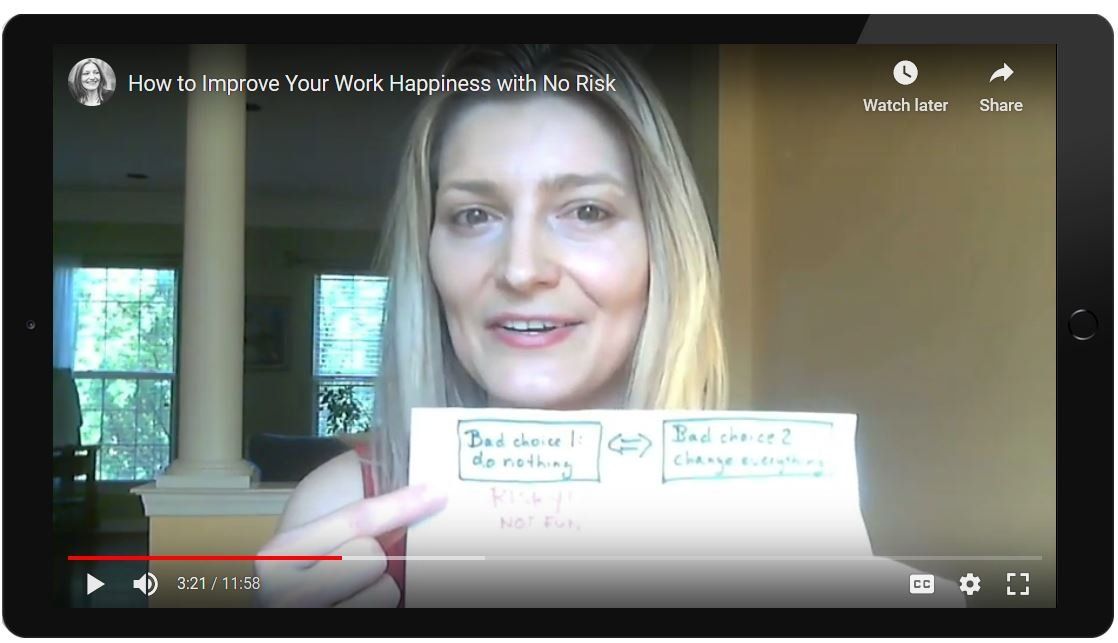How to Stop Playing Small in 5 Simple Steps
Are you ready to stop playing small?
If you’ve been with me from the beginning of the Work You Love 101 series, you’ve read my prompt about stepping into your unique leadership and getting out of your own way.
Related to both of these ideas is today’s prompt about breaking the…
Spell of Smallness (hitherto “SOS”/pun intended)
But first, what the heck is the spell of smallness?
A quick google search reveals that “spell of smallness” is not a commonly used phrase. I myself first heard it from Dr. Brian Whetten, an executive coach, and liked the poignancy of the term.
Being under a spell implies not being fully aware of what’s going on. It also brings up feelings of helpless- and powerlessness which is exactly how the SOS can feel like.
The SOS is related to the fear of being seen and being successful. It’s us keeping ourselves in a box. It’s the opposite of daring greatly.
Bestselling spiritual author Marianne Williamson succinctly described it in the following words:
“Our deepest fear is not that we are inadequate. Our deepest fear is that we are powerful beyond measure. It is our light, not our darkness that most frightens us.”
Reasons for letting go of the SOS
As Zdravko Cvijetic put it in his viral Medium article, playing small is one of the things you need to give up to be successful:
“If you never try and take great opportunities, or allow your dreams to become realities, you will never unleash your true potential.”
You shouldn’t only give up on playing small for yourself but also for those who could really benefit from what you have to share.
As Marianne Williamson pointed out:
“Your playing small does not serve the world.”
When you stop playing small, you can become a role model for others. In his article How To Conquer Your Fears And Reclaim Your True Power, Tony Fahkry put it this way:
“As you claim and step into your glory, you allow others to see the possibility of attaining the same freedom… There is an underdog within us all waiting to appear.”
Why the SOS exists
To quote, erm… myself:
In other words, the SOS exists to protect us. If we never try, we can’t fail, right?
Except if we don’t try, we’ve already failed. Or, as ice hockey legend Wayne Gretzky put it:
“You miss 100% of the shots you don’t take.”
Of course, fear doesn’t simply disappear because we want it to. That’s not how it works. When we try to fight our fear, it often gets stronger. Of course, giving in to our fear also isn’t a solution.
What to do?
Well, instead of treating our fear like an enemy and going into fight/flight mode, how about befriending it? Check out my article for the best way to reduce fear by changing your attitude towards it.
With all that being said, let’s move on to…
Taking action
Grab a pen and paper. 📝Then, take a moment to go through the following process.
(If you want to get the most out of this or if you're afraid of getting
stuck, get the "Taking Action Worksheets" and begin by filling those
out.)
Be specific about what that would mean for you. Different people have different interpretations of that.
For instance: “In two months, I’m giving a paid workshop about how to be more creative to 20 people.” 💪
2. Rank your fear
On a scale of 1 (no fear at all) to 10 (panic attack), how much fear does this bring up for you?
3. Explore your worst-case scenario
What is the worst-case scenario your fear wants to warn you about? Even if it sounds catastrophic to you, please write it down.
For instance: “Nobody shows up to my workshop at all. Or worse, 2 people show up so I also get to feel super-embarrassed in front of them. I feel so bad about all this that I give up on pursuing my dreams forever and have huge regrets later in life.” 😢
4. Brainstorm options 💭
Brainstorm what actions you could take to make that outcome less likely.
For instance: “Since this would be my first workshop, maybe I could set my expectations a bit lower. If only 8 people attend, that would still be a success. I should start promoting this right away so that I have more time to fill it. And, I could get advice from people who have been through this before.”
5. Pick one of these options and start taking action
For instance: “I will contact with friend Danny and ask him for advice. He’s been doing workshops for years and years, so I’m sure he has some great advice.”
The idea 💡
To connect more deeply with your passion and purpose, stop playing small. You don’t need to puff yourself up or pretend you’re more than you actually are. While that may appear to be different than playing small, it’s still based on feelings of insignificance.
Instead of either posturing (pretending to be bigger than you are) or collapsing (pretending to be smaller that you are), simply take up the space you naturally take up.
If you have a skill or a talent, own that. If someone gives you a nice compliment or positive feedback, receive it.
For so many people, it's important to learn how to shine without shame. Below, you'll find a conversation I hosted about that topic. While the conversation itself revolved around women's self esteem and confidence, I believe the lesson in this video apply to everyone, regardless of gender.







